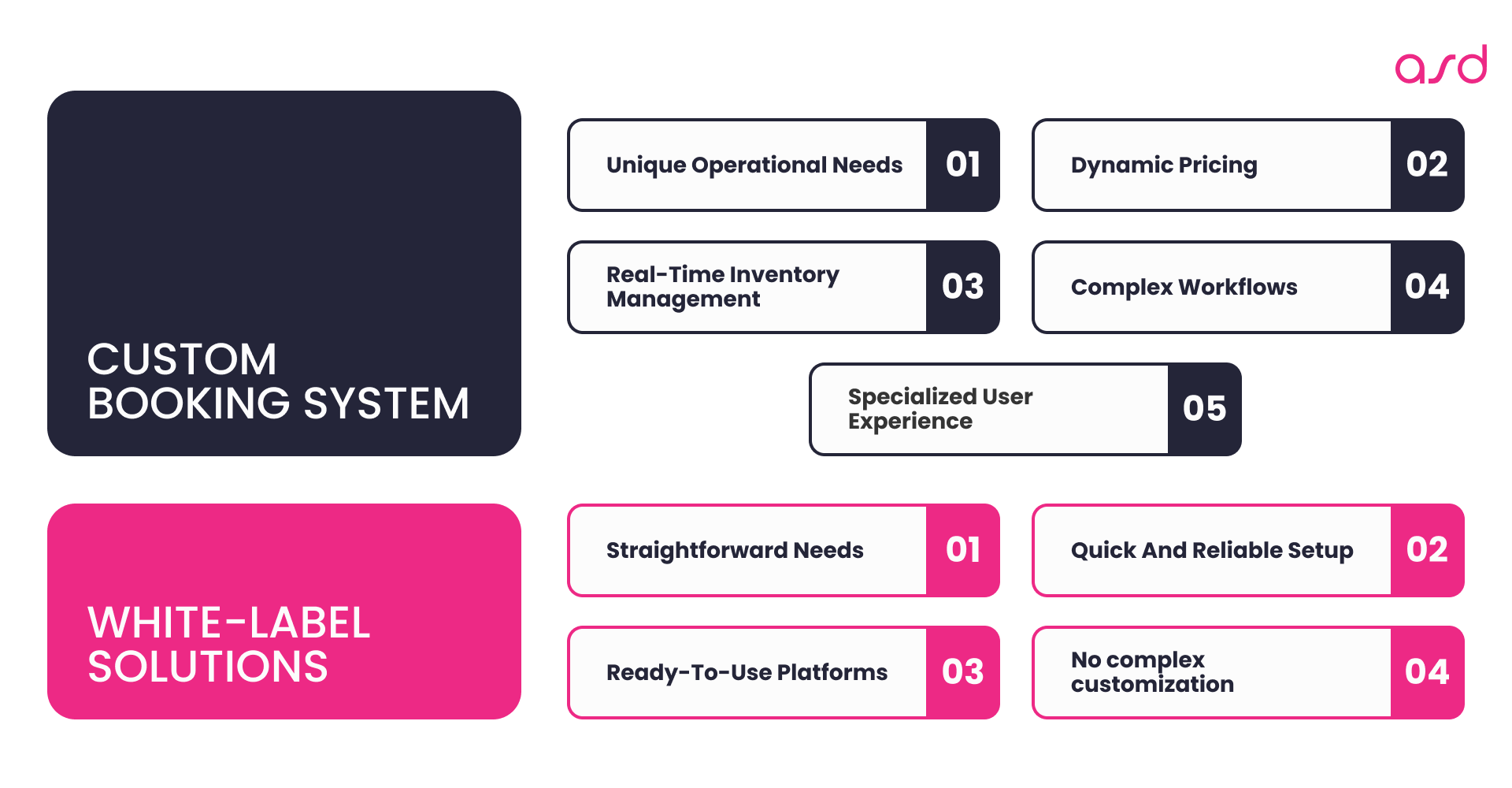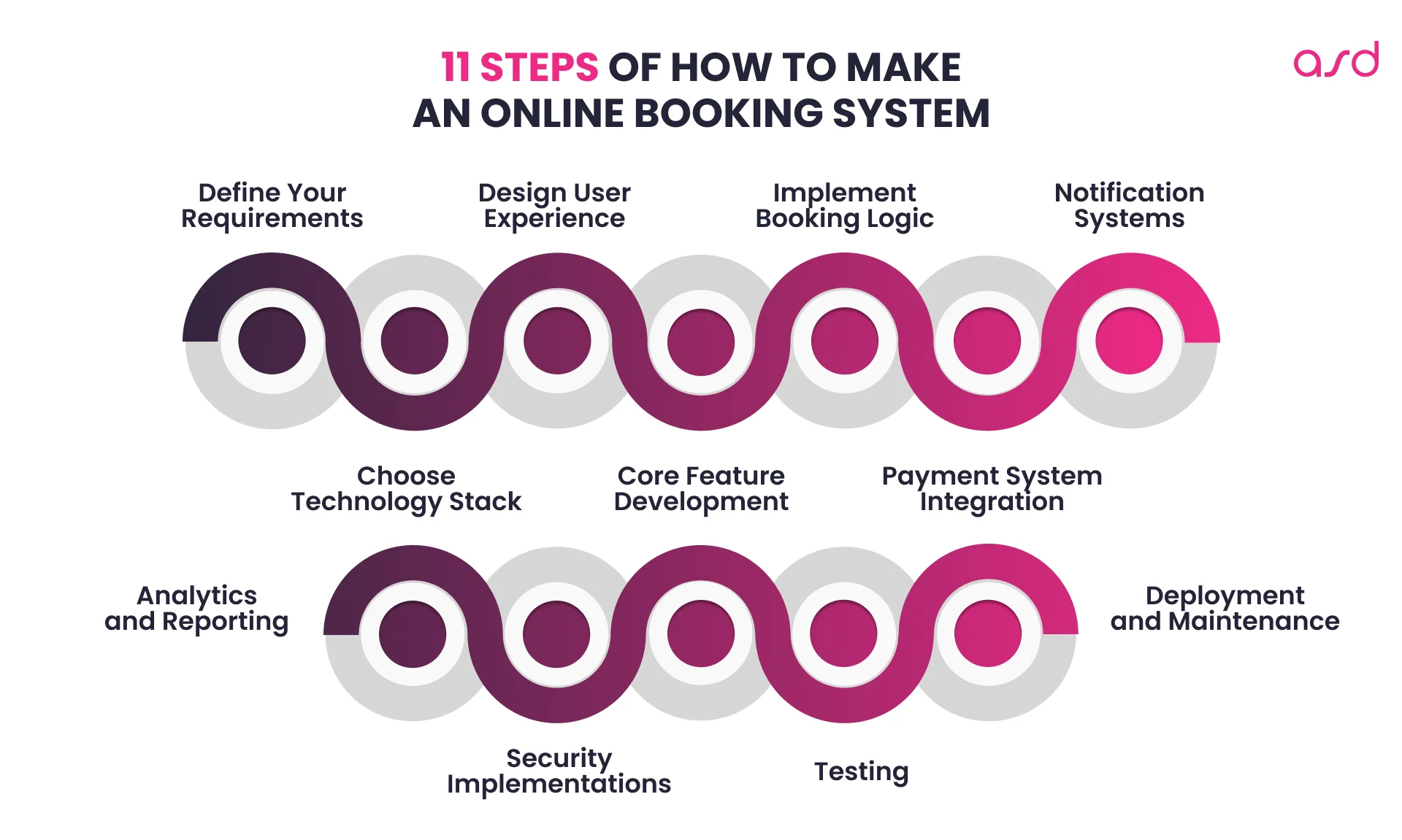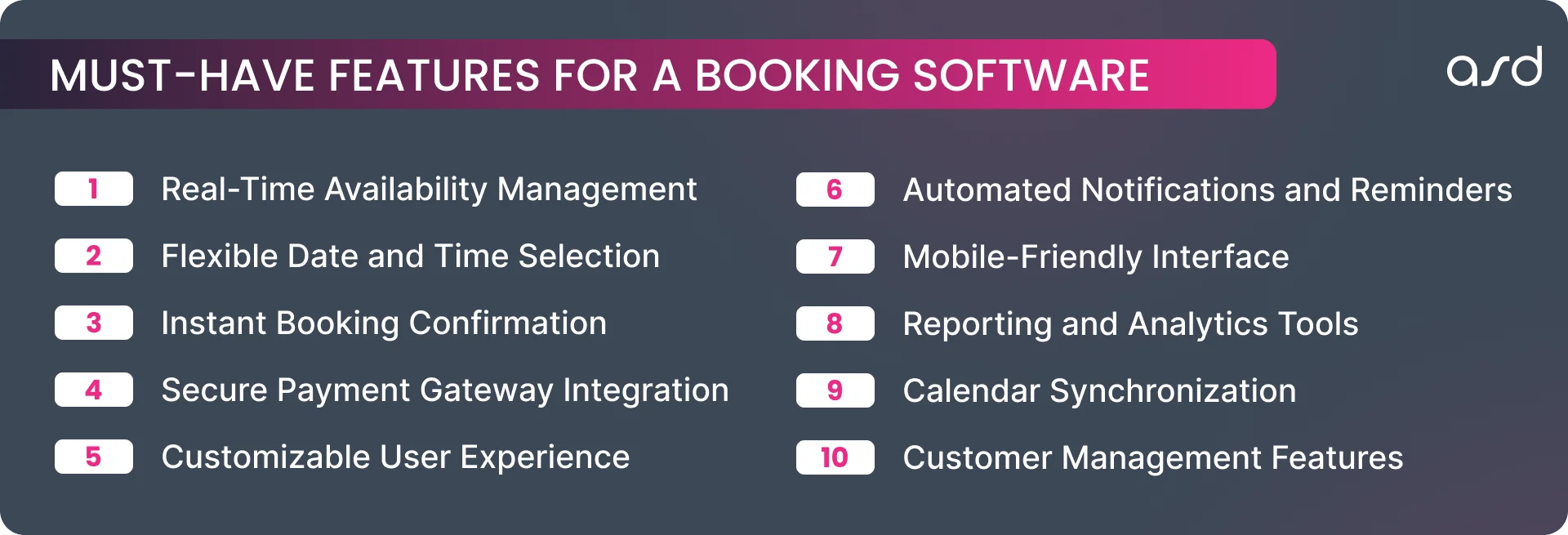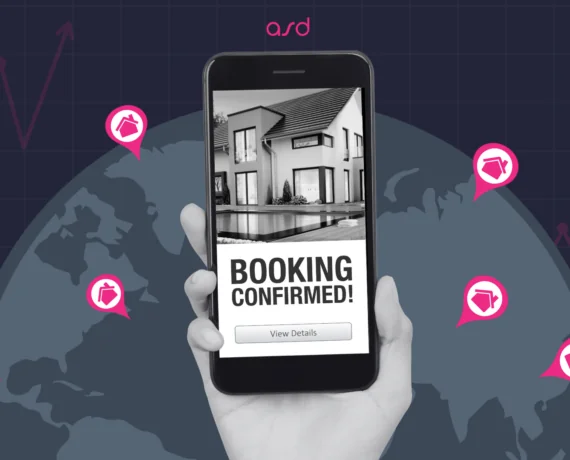Table of Content
- Definition and Benefits of an Online Booking System
- Businesses that Can Benefit from an Online Booking System
- When to Develop Your Custom Booking System
- When to Use White-Label Booking Solutions
- Understanding of Custom Online Booking Systems
- Choosing the Right Platform for Your Booking Website
- 11 Steps of How to Make an Online Booking System
- Marketing and Promotion Strategies
- Cost of Developing Custom Booking System
- Finish Line of Booking Engine Development
Find out what type is best for you!
Book a callBusinesses are often tempted to jump headfirst into custom software development, believing that a tailor-made solution is the ultimate answer to their operational challenges. However, the reality is far more nuanced. Many companies rush to build their own booking systems, Travel API, CRM, etc, without carefully evaluating whether such an investment is truly necessary or beneficial. But, in this article, we will focus, exclusively, on booking engines.
Before you start building your booking system, it’s important to assess whether your business really needs one, what type of system fits your goals, how to choose tech stack for your product, and whether you should invest in custom development or use off-the-shelf solutions. For businesses that require efficient and automated management of client appointments, an appointment booking system can simplify the scheduling process, set availability, and integrate functionalities like notifications to enhance user experience. The right choice depends on your business model, operational needs, and growth plans to ensure that the system effectively supports both your goals and user experience.
This comprehensive guide will walk you through the critical considerations, helping you make an informed decision about your booking system strategy. We’ll explore the pros and cons of custom development, off-the-shelf solutions, and hybrid approaches, providing you with the insights needed to choose the most appropriate path for your business.
The Decision-Making Framework
When approaching your booking system development, consider these critical questions:
- Does this solution solve our current operational challenges?
- Can it adapt to future business needs?
- Will it enhance or potentially disrupt our customer experience?
Definition and Benefits of an Online Booking System
An online booking system is a digital platform that enables businesses to manage and schedule appointments with clients seamlessly. This system allows customers to book services online, eliminating the need for phone calls, emails, and in-person appointments. The benefits of an online booking system are manifold. Firstly, it significantly increases efficiency by automating the booking process, freeing up valuable time and resources for your business. Secondly, it reduces no-shows by sending automated reminders to customers, ensuring they remember their appointments. Lastly, it enhances customer satisfaction by providing a convenient and user-friendly booking experience. With just a few clicks, customers can book appointments at their convenience, leading to a smoother and more efficient booking process.
Businesses that Can Benefit from an Online Booking System
Any business that relies on appointments or reservations can greatly benefit from an online booking system. Here are some examples:
- Service-Based Industries: Salons, spas, fitness studios, and healthcare providers can streamline their appointment scheduling, reducing administrative tasks and improving customer satisfaction.
- Hospitality: Hotels, restaurants, and event venues can manage reservations more efficiently, ensuring a seamless experience for their guests.
- Education: Schools, universities, and training centers can handle class registrations and appointments with ease, enhancing the overall experience for students and staff.
- Retail: Stores, boutiques, and online marketplaces can offer appointment-based shopping or consultations, providing a personalized shopping experience.
- Healthcare: Medical offices, dental clinics, and hospitals can manage patient appointments more effectively, reducing wait times and improving patient care.
By implementing an online booking system, these businesses can reduce administrative tasks, increase customer satisfaction, and improve their overall efficiency.
When to Develop Your Custom Booking System
- Your business has unique operational requirements
- Existing solutions don’t meet your specific needs
- You require advanced features like:
- Dynamic pricing
- Real-time inventory management
- Complex booking workflows
- Specialized user experience
- Customizable booking form
When to Use White-Label Booking Solutions
By contrast, if your needs are straightforward, existing platforms might be your best friend. Consider them the “quick and reliable” option — perfect for businesses looking to get up and running without reinventing the wheel.

Understanding of Custom Online Booking Systems
Like any good technology, online booking systems, like travel booking software, are about solving real-world problems. They’re not just digital forms — they’re bridges connecting your business to your customers, removing friction and creating seamless experiences.
After recognizing the need for a custom booking system, you’re now ready to learn the critical aspects of development. Consider this section as a guide to understanding the core components, architectural considerations, and strategic approaches to building a robust booking system that meets your specific business requirements.
Your custom booking system is more than just a digital tool — it’s a strategic asset designed to address unique operational challenges, streamline reservation processes, and create a seamless experience for both your business and your customers. The journey from concept to a fully functional system involves careful planning, technical expertise, and a deep understanding of your specific business ecosystem.
Key considerations at this stage include:
- Defining precise functional requirements
- Identifying critical features unique to your business model
- Understanding the technical infrastructure needed
- Mapping out user interaction and experience flows
- Ensuring scalability and future adaptability
Booking Engine Development: The Technical Foundation A booking engine serves as the core mechanism for managing reservations, pricing, and customer interactions. For businesses developing a custom solution, this means creating a flexible, powerful system that goes beyond off-the-shelf alternatives.
Key Development Focus Areas:
- Creating a robust reservation management framework
- Implementing dynamic pricing mechanisms
- Designing intuitive user interfaces
- Ensuring seamless integration with existing systems
- Building scalable and secure transaction processes
By focusing on these fundamental aspects, you’ll be positioned to develop a booking system that not only meets your current needs but also provides room for future growth and innovation.
Must-Have Features for a Booking Software
When choosing a booking system, certain features are essential to ensure a smooth user experience and operational efficiency. Here are the must-have features every booking software should include:
1. Real-Time Availability Management
Instantly update and display available slots, preventing double bookings and ensuring seamless scheduling.
2. Flexible Date and Time Selection
Allow customers to choose their preferred dates and times with an intuitive calendar interface.
3. Instant Booking Confirmation
Automate confirmation emails or SMS notifications to reassure customers that their booking is secured.
4. Secure Payment Gateway Integration
Support multiple payment options (credit card, PayPal, etc.) while ensuring secure transactions and compliance with industry standards.
5. Customizable User Experience
Tailor the interface to match your branding and ensure a user-friendly, frictionless booking process for customers.
6. Automated Notifications and Reminders
Send reminders, updates, or alerts for bookings, cancellations, and modifications to keep both customers and staff informed.
7. Mobile-Friendly Interface
Optimize the booking experience for mobile devices, ensuring users can book easily on the go.
8. Reporting and Analytics Tools
Track key metrics such as booking conversion rates, revenue, and customer behaviors to make data-driven decisions.
9. Calendar Synchronization
Sync bookings with external calendars (Google Calendar, Outlook, etc.) for seamless scheduling management.
10. Customer Management Features
Enable user profile creation, booking history tracking, and personalized service options to improve customer relationships.
Types of Booking Systems
Each system tells a different story. Some are off-the-rack solutions, while others are custom-tailored suits, perfectly fitted to your business’s unique shape. Let’s take a closer look.
1. Software-as-a-Service (SaaS) Booking Systems
-
- Characteristics:
- Pre-configured templates
- Quick setup
- Subscription-based model
- Limited customization
- Best Suited For:
- Small businesses
- Service providers with standard booking needs
- Startups with limited technical resources
- Pros:
- Low initial investment
- Rapid implementation
- Regular updates
- Cons:
- Less flexibility
- Potential feature limitations
- Characteristics:
2. Custom-Built Booking Systems
-
- Characteristics:
- Fully tailored to specific business needs
- Unlimited customization potential
- Scalable architecture
- Best Suited For:
- Large enterprises
- Complex service industries
- Businesses with unique booking requirements
- Pros:
- Perfect feature alignment
- Seamless system integration
- Competitive differentiation
- Cons:
- Higher development costs
- Longer implementation time
- Ongoing maintenance requirements
- Characteristics:
3. Hybrid Booking Solutions
-
- Characteristics:
- Combination of off-the-shelf and custom components
- Modular design
- Flexible implementation
- Best Suited For:
- Businesses outgrowing standard solutions
- Companies with evolving booking needs
- Pros:
- Cost-effective customization
- Reduced development time
- Incremental feature addition
- Cons:
- Potential integration challenges
- Complexity in management
- Characteristics:
Start your booking project! Work with our team to develop a user-friendly booking engine that fits your needs. 

If, after careful consideration, you decide to build a custom booking engine, we recommend that you familiarize yourself with the detailed steps for doing so.
Choosing the Right Platform for Your Booking Website
When choosing a platform for your booking website, several factors should be considered to ensure it meets your business needs:
- Ease of Use: Look for a platform with a user-friendly interface that is easy to navigate for both you and your customers.
- Customization Options: Choose a platform that allows you to customize your website to fit your brand and specific business requirements.
- Integration with Payment Gateways: Ensure that the platform integrates seamlessly with your preferred payment gateways, providing a smooth transaction process for your customers.
- Mobile-Friendliness: Select a platform that is optimized for mobile devices, ensuring a smooth user experience for customers booking on the go.
- Scalability: Opt for a platform that can grow with your business, handling increased traffic and bookings as your business expands. At ASD Team, we develop scalable travel portal solutions that adapt to growing inventories, users, and integrations.
Popular website builders for creating a booking website include Wix, Squarespace, and WordPress. These platforms offer a range of features and customization options, making it easier to create a booking website that meets your needs.
11 Steps of How to Make an Online Booking System
1. Define Your Requirements
- Identify specific business needs
- List essential and nice-to-have features
- Determine target user experience
- Outline integration requirements
2. Choose Technology Stack
Recommended technologies:
- Backend: Node.js, Python (Django), Ruby on Rails
- Frontend: React, Vue.js
- Database: PostgreSQL, MongoDB
- Payment Integration: Stripe, PayPal
3. Design User Experience
Key UX considerations:
- Intuitive interface
- Mobile responsiveness
- Clear booking steps
- Minimal friction in the booking process
4. Core Feature Development
Must-have features:
- Real-time availability checking
- Flexible date selection
- Instant booking confirmation
- Secure payment gateway
- User profile management
5. Implement Booking Logic
Critical backend functionalities:
- Inventory management
- Conflict prevention
- Time zone handling
- Pricing rules
- Availability calculations
6. Payment System Integration
Payment system requirements:
- Multiple payment methods
- Secure transaction processing
- Refund and cancellation handling
- PCI DSS compliance
7. Notification Systems
Communication features:
- Automated email confirmations
- SMS reminders
- Calendar sync options
- Booking modification alerts
8. Analytics and Reporting
Tracking capabilities:
- Booking conversion rates
- Revenue per booking
- Peak booking times
- Customer behavior insights
9. Security Implementations
Security layers:
- SSL encryption
- Two-factor authentication
- GDPR/CCPA compliance
- Regular security audits
10. Testing
Comprehensive testing phases:
- Unit testing
- Integration testing
- User acceptance testing
- Performance stress testing
11. Deployment and Maintenance
Post-launch considerations:
- Cloud hosting (AWS, Google Cloud)
- Continuous monitoring
- Regular updates
- Scalability planning

After launch, gather user feedback and monitor system performance to make iterative improvements. To ensure users keep returning, it’s also crucial to improve travel app retention rate through personalization, loyalty strategies, and well-timed engagement tactics.
Marketing and Promotion Strategies
To promote your booking website and attract more customers, consider implementing the following strategies:
- Search Engine Optimization (SEO): Optimize your website for search engines to improve visibility and drive organic traffic. Use relevant keywords, create high-quality content, and ensure your website is technically sound.
- Social Media Marketing: Promote your website on social media platforms to reach a wider audience. Share engaging content, run promotions, and interact with your followers to build a strong online presence.
- Email Marketing: Send targeted email campaigns to your customers and subscribers to promote your services and special offers. Personalized emails can help increase engagement and drive bookings.
- Content Marketing: Create valuable content such as blog posts, videos, and guides to attract and engage with your target audience. Providing useful information can establish your business as an authority in your industry.
- Paid Advertising: Use paid advertising channels such as Google Ads and Facebook Ads to reach a wider audience and drive traffic to your website. Targeted ads can help you reach potential customers who are actively searching for your services.
By implementing these strategies, you can increase visibility, drive traffic, and attract more customers to your booking website, ultimately enhancing your business’s success.
Cost of Developing Custom Booking System
After sorting out the intricacies of booking system development, you’re obviously wondering about the financial investment required to bring your digital project to life. Understanding the potential costs is crucial for businesses of all sizes, from startups to established enterprises.
Factors Affecting Development Costs
- Complexity of features
- Technology stack
- Design customization
- Integration requirements
- Ongoing maintenance needs
Cost Ranges
- Basic System: $5,000 – $15,000
- Medium Complexity: $15,000 – $40,000
- Advanced Custom System: $40,000 – $100,000+
Disclaimer: These cost ranges are approximate estimates based on industry averages. The actual development costs for your specific booking system may vary significantly depending on unique business requirements, technological complexity, and specific project scope. We recommend consulting with us to get a precise quote tailored to your exact needs.
Build your perfect booking system
Finish Line of Booking Engine Development
The travel booking engine development is more than a technical project — it’s a strategic transformation of how your business connects with customers. As we’ve explored, booking systems have evolved from simple reservation tools to sophisticated platforms that can significantly impact your operational efficiency and customer experience.
Key Strategic Insights
- Technology as a Business Enabler
- A booking system is not just software, but a critical business strategy
- The right solution can dramatically reduce administrative overhead
- Provides data-driven insights into customer behavior and preferences
- Adaptability is Key
- Choose a solution that can grow and change with your business
- Consider future scalability from day one
- Build flexibility into your booking system architecture
- Customer Experience at the Forefront
- Your booking system is often the first interaction customers have with your business
- Prioritize intuitive design and seamless user journeys
- Continuous improvement based on user feedback is crucial
Implementation Roadmap
- Assessment Phase
- Conduct a thorough internal audit of current booking processes
- Identify pain points and desired improvements
- Define clear objectives and success metrics
- Solution Selection
- Evaluate custom vs. off-the-shelf solutions
- Consider the total cost of ownership
- Assess long-term scalability
- Implementation Strategy
- Start with a minimum viable product (MVP)
- Plan for iterative improvements
- Establish a continuous feedback loop
Financial Considerations
Investment Perspective:
- View your booking system as a strategic asset
- Calculate potential ROI through:
- Reduced administrative time
- Improved customer conversion rates
- Enhanced operational efficiency
- Data-driven business insights
Final Thoughts on How to Build a Booking System
Creating an online booking system is not a destination, but a journey of continuous improvement. The most successful businesses view their booking technology as a dynamic, evolving tool that adapts to changing market needs and customer expectations.
When you create a website with a booking system, you’re not just adding a feature — you’re transforming your digital presence. Learning how to create a booking system requires a strategic approach that combines technology, user experience, and business goals. Your booking system should be more than a functional tool; it should be an extension of your brand’s commitment to customer convenience and operational excellence. Online bookings can significantly enhance customer convenience and operational efficiency by streamlining scheduling and payment processes.
The most successful booking systems are those that seamlessly blend technical functionality with intuitive design, making the reservation process as simple and enjoyable as possible for your customers.
Remember that the process of creating a booking system is iterative. Start with a solid foundation, listen to user feedback, and be prepared to adapt and evolve your solution as your business grows and technology advances. If your booking system requires specific functionality, consider exploring custom API development or API integration to ensure a seamless connection and tailored features that meet your needs.
Pro Tip: Your booking system should be viewed as a living ecosystem, not a one-time implementation. The most successful platforms are those that continuously evolve, adapt and respond to changing business and customer needs.
To create a website with a booking system, start by choosing a website builder or content management system (like WordPress or Shopify) with booking plugins. For custom solutions, work with developers to implement tailored booking engine features that include real-time availability, payment options, and a seamless user experience. Combining these tools ensures you’re creating a booking system that improves customer satisfaction and efficiency.
The cost of developing an online booking system varies based on features and complexity. A basic system starts at $5,000–$15,000, while advanced solutions with custom features and integrations can range from $20,000–$50,000 or more.
To build a booking system, follow these key steps:
- Define your business requirements and must-have features (e.g., real-time availability and payment integration).
- Choose a technology stack that supports scalability.
- Develop core features like a user-friendly interface and automated notifications.
- Test the system thoroughly before deployment. By understanding booking engine features and aligning them with your goals, you can create a system that enhances your operations.
Yes, you can create your own online booking system using existing platforms or website builders that offer pre-built booking integrations. These tools allow you to set up a booking system without coding. For businesses with complex needs, investing in travel & hospitality software development or hiring developers may be a better approach. For a deeper dive, explore our travel portal development services and discover how we can help businesses grow through smarter distribution.
The essential booking engine features include:
- Real-time availability management to prevent double bookings.
- Secure payment gateway integration.
- Customizable user interfaces for a smooth booking experience.
- Automated notifications and reminders for customers.
- Analytics tools to track bookings and customer behavior. Understanding these features helps you learn how to create a booking system tailored to your needs.
Questions? Answers!
How do I create a website with a booking system?
To create a website with a booking system, start by choosing a website builder or content management system (like WordPress or Shopify) with booking plugins. For custom solutions, work with developers to implement tailored booking engine features that include real-time availability, payment options, and a seamless user experience. Combining these tools ensures you’re creating a booking system that improves customer satisfaction and efficiency.
How much does an online booking system cost to develop?
The cost of developing an online booking system varies based on features and complexity. A basic system starts at $5,000–$15,000, while advanced solutions with custom features and integrations can range from $20,000–$50,000 or more.
How to build a booking system for my business?
To build a booking system, follow these key steps:
- Define your business requirements and must-have features (e.g., real-time availability and payment integration).
- Choose a technology stack that supports scalability.
- Develop core features like a user-friendly interface and automated notifications.
- Test the system thoroughly before deployment.
By understanding booking engine features and aligning them with your goals, you can create a system that enhances your operations.
Can I create an online booking system without technical expertise?
Yes, you can create your own online booking system using existing platforms or website builders that offer pre-built booking integrations. These tools allow you to set up a booking system without coding. For businesses with complex needs, investing in travel & hospitality software development or hiring developers may be a better approach.
What are the key features of a booking engine?
The essential booking engine features include:
- Real-time availability management to prevent double bookings.
- Secure payment gateway integration.
- Customizable user interfaces for a smooth booking experience.
- Automated notifications and reminders for customers.
- Analytics tools to track bookings and customer behavior.
Understanding these features helps you learn how to create a booking system tailored to your needs.





